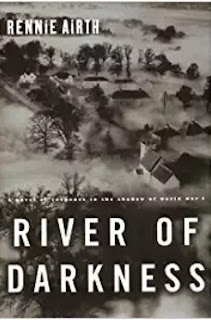Still, I must be honest and admit that although I did enjoy The Secret Place, it's not my favorite entry into the series, and I'm not entirely sure why.
The plot is intriguing enough. It's the resurrection of an unsolved cold case. A popular boy was murdered on the grounds of a posh boarding school for girls (he's a student at the obligatory adjacent boys' boarding school). The case is brought to Detective Stephen Moran by Frank Mackey's daughter, Holly. Now a teenager and a student at the boarding school, she proffers Moran an anonymous postcard claiming to know who killed the boy.
Painfully eager to get out of cold cases and into the Murder Squad, Moran brings the case to Detective Antoinette Conway, an island of ball-busting, angry feminist competence in a unit that's ostracized her. Neither detective can afford to fail, both for their professional sakes and because doing so will mean victory for the personal demons each respectively barely keeps at bay.
Painfully eager to get out of cold cases and into the Murder Squad, Moran brings the case to Detective Antoinette Conway, an island of ball-busting, angry feminist competence in a unit that's ostracized her. Neither detective can afford to fail, both for their professional sakes and because doing so will mean victory for the personal demons each respectively barely keeps at bay.
All the ingredients of a great contemporary mystery are present: an intense, slow-build of procedural tension over the period of basically 24-hours (except the flashbacks, of course), enough unexpected or simply unresolved character developments to keep even veteran armchair sleuths like myself guessing and engaged, and a truly well-done job giving a lot of characters, of different ages, very distinct personalities and voices (this is harder to do than most people realize; in my opinion, it's an ability that elevates writer from merely "good" to "great"). For fans of the series, you get to see how Frank Mackey's daughter has grown up after the events of Faithful Place, which is neat. As always, however, you don't need to read the other books in the series to appreciate this one.
And yet...
When I read Det. Conway was the protagonist of French's next entry into the series, I was glad because she is a wonderful character who I absolutely want to see more of (and so much the type of strong, takes-no-shit-from-anyone woman I wish my recovering people-pleaser self could be). But I also liked Det. Moran and felt Conway, by sheer force of personality, overshadowed him and the other characters, even though the novel is narrated from Conway's point of view. The strongest parts of the novel were in flashbacks of the Holley and her tight-knit circle of friends.
Which is, of course, one of the main strengths of the novel, the way French captured the intensity and intimacy of friendships at that age. Initially, I was worried it would rehash the vibe in The Likeness, which explores the family you find in friends in college. But though equally formative and intense, that type of friendship is, of course, an entirely different thing. I should've known better than to doubt Tana French; these friends, too, have their own feel and rhythm.
Which is, of course, one of the main strengths of the novel, the way French captured the intensity and intimacy of friendships at that age. Initially, I was worried it would rehash the vibe in The Likeness, which explores the family you find in friends in college. But though equally formative and intense, that type of friendship is, of course, an entirely different thing. I should've known better than to doubt Tana French; these friends, too, have their own feel and rhythm.
Overall, it's another successful installment in one of my favorite series. But it's not the best of the bunch, at least for me.
















